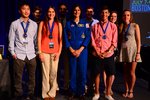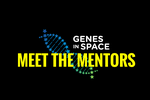Congratulations Anna-Sophia Boguraev, Genes in Space 2015 Winner

Student DNA Experiment Selected as Winner of
Genes in Space Science Competition
Experiment to be performed aboard International Space Station
Boston, MA, July 8th, 2015 – Boeing, the Center for the Advancement of Science in Space (CASIS), Math for America (MƒA), and miniPCR named Anna-Sophia Boguraev from Bedford, NY, the winner in the first ever Genes in Space competition. The innovative contest called for students in grades 7 through 12 to design an experiment to solve a real-life space exploration problem through DNA analysis. The team’s winning experiment will be performed aboard the International Space Station (ISS) using miniPCR technology.
Boguraev (16) aims to test the effect of microgravity and cosmic radiation on the immune system in space. Immune suppression affects astronaut health during space missions, but the underlying causes are not fully understood. By interrogating the genetic regulation of the immune system in space, Anna-Sophia hopes to offer new avenues to enhance human health during prolonged spaceflight missions.
Boguraev’s winning experiment was announced at the ISS Research and Development Conference in Boston, Massachusetts on July 8, 2015. She was among five finalist teams who were invited to present their proposals before a prestigious panel of scientists, educators, and technologists at the conference. Boguraev will have her experiment performed 250 miles above the Earth aboard the ISS and will be invited to watch the launch of her experiment into orbit.
The esteemed panel of judges for the Genes in Space competition included: Ezequiel Alvarez Saavedra, co-founder of miniPCR; Elinor Karlsson, assistant professor, University of Massachusetts Medical School; Uzma Shah, MƒA Master Teacher; Gary Ruvkun, professor of genetics at Harvard Medical School; Breton Hornblower, lead of DNA amplification technologies at New England Biolabs; and Philip Schein, member of the board of CASIS.
Boeing, CASIS, MƒA, and miniPCR launched the contest to foster creativity, collaboration, and critical thinking among young innovators bridging the biological and physical sciences. Boguraev was chosen from a competitive group of 330 applications from across the country.
PCR is a method for making copies of a particular sequence of DNA in order to detect or conduct experiments on that sequence. Since PCR instruments are so complex and expensive, miniPCR created a compact version to make high-level science more accessible to the general population, scientists, and educators. DNA amplification has never been conducted in space before, and Boguraev’s winning proposal from Genes in Space will become one of the first DNA amplification experiments ever to be done outside of the Earth.
For more information about the Genes in Space competition, finalists, and the honorable mentions, visit: www.genesinspace.org.
About:
A unit of The Boeing Company, Defense, Space & Security is one of the world’s largest defense, space and security businesses specializing in innovative and capabilities-driven customer solutions, and the world’s largest and most versatile manufacturer of military aircraft. Headquartered in St. Louis, Defense, Space & Security is a $31 billion business with 53,000 employees worldwide. Follow us on Twitter: @BoeingDefense.
The Center for the Advancement of Science in Space (CASIS) was selected by NASA in July 2011 to maximize use of the International Space Station (ISS) U.S. National Laboratory through 2020. CASIS is dedicated to supporting and accelerating innovations and new discoveries that will enhance the health and wellbeing of people and our planet. www.iss-casis.org
MƒA is a nonprofit organization that aims to make teaching a viable, rewarding, and respected career choice for the best minds in science and mathematics. The MƒA Master Teacher Fellowship achieves this goal by bringing together outstanding, experienced teachers to share knowledge, advance teaching skills, and define excellence itself. This remarkable community of teachers is changing the very landscape of science and mathematics education. MƒA offers fellowships and advocates for this model around the country, so that all students can have great math and science teachers—teachers who are true masters of the subject matter and deeply committed to the craft of teaching. www.MathForAmerica.org
miniPCR/Amplyus is dedicated to bringing DNA science to more people in more places. The team of molecular biologists, designers, and engineers reinvents scientific technology to make it portable, affordable, and user-friendly. Amplyus has conceived and developed miniPCRTM to empower everyone to discover and experiment with DNA. www.minipcr.com
Contact:
Kenneth Ulmer, Boeing
Space Exploration
Office: +1 281-226-4872
kenneth.ulmer@boeing.com
Sarah Rooney, MƒA
Office: +1 646-437-0921
srooney@mathforamerica.org
Sebastian Kraves, miniPCR
Office: +1 781-990-8727
genesinspace@minipcr.com
Patrick O’Neill, CASIS
Office: +1 321-480-1054
poneill@iss-casis.org


